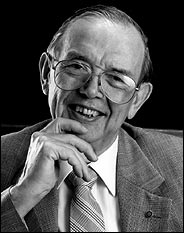The News Manipulators
Reed Irvine, noted journalist, media critic, and a leading authority on media bias, began the work that would become his legacy, in retirement.
The founder and longtime chairman of Accuracy in Media and its sister organization, Accuracy in Academia, Mr. Irvine was an economist, Fulbright scholar and former Federal Reserve official who served in the Pacific in World War II as a Japanese language officer with the 2nd Marine Division. He launched Accuracy in Media (AIM) in 1969 and its sister organization, Accuracy in Academia, in 1985.
Mr. Irvine pioneered the concept of a citizens’ media watchdog organization that criticized the errors and omissions of the mainstream press, buying ads to publicize serious errors and buying stock in media companies to enable AIM representatives to attend their annual meetings to discuss its complaints with their chairmen.
By publicizing and exposing the media’s misreporting through the AIM Report newsletter, weekly columns and daily radio broadcasts, Reed Irvine challenged America’s largest and most influential journalists and media companies to account for their errors, and stick to the facts. In a move well ahead of its time, he also encouraged the AIM membership to take a pro-active role in keeping the media’s feet to the fire by sending postcards to offending journalists and big media companies.
Devoted to frugality and low overhead, Mr. Irvine was fond of saying that he launched AIM “with a check for $200 from a millionaire supporter,” and announced that “we were going to take on CBS, ABC, NBC and The New York Times and The Washington Post.”
In AIM’s early days, Mr. Irvine believed that sending a lot of letters to editors, pointing out their inaccurate and biased coverage, would obligate them to correct their errors. He later realized this assumption was rather naive.
After more than three decades of publicizing and exposing some of the most significant misreported stories, Reed Irvine never claimed that he was single-handedly responsible for educating the media consuming public about biased and slanted news coverage. But the fact that 2/3 to 3/4 of current media survey respondents say they distrust the information from the mainstream press is certainly no coincidence.
Over the years, Mr. Irvine become nothing short of a hero to his many thousands of supporters for his courageous and steadfast positions based on the pursuit of factual information. His audience of grassroots Americans cheered his numerous innovative methods of challenging big media organizations to tell the truth, including:
(1) holding confrontational news conferences
(2) running full-page ads in major publications
(3) submitting shareholders’ resolutions at annual meetings
(4) his appearances on Ted Koppel’s “Viewpoint” programs (a corollary of ABC’s “Nightline”concerning media issues)
(5) his persistence in contradicting inconclusive evidence about important issues ranging from the Vincent Foster case to TWA Flight 800
One of Mr. Irvine’s best known clashes with media titans was one in 1978 that resulted in then-Washington Post editor Ben Bradlee sending him a letter calling him a “miserable, carping retromingent vigilante,” adding that “I, for one, am sick of wasting my time in communication with you.” Mr. Irvine proudly displayed the letter on his conference room wall, along with scores of awards and plaques for service to his country and its citizens.
Although journalists claim to write the first draft of history, Mr. Irvine thought this became a problem when their first draft of history was flawed and needed corrections. During the Cold War, he often quoted from Arthur Koestler’s essay, “The God that Failed,” where Koestler, who had been a Communist, said that he had concluded that a harmful truth was better than a useful lie.
Reed Irvine was born in Salt Lake City, Utah, the son of William J. and Edna May Irvine. He graduated from the University of Utah at the age of 19 in 1942, having been elected to Phi Beta Kappa. He enlisted in the Navy and was selected to take a crash program in the Japanese language, emerging as an interpreter-translator with a commission in the U.S. Marine Corps. He participated in the campaigns of Saipan, Tinian and Okinawa as an intelligence officer with the 2nd Marine Division, and served in the occupation of Japan from 1945 to 1948.
Upon his return from Japan, Mr. Irvine was awarded a Fulbright scholarship to Oxford University, where he studied from 1949 to 1951, earning a B. Lit. Degree in economics.
He joined the Federal Reserve Board in 1951 as an economist in the Far East Section of the Division of International Finance. An early critic of central planning and excessive dependence on foreign aid, he lectured and wrote extensively about free market economics, advocating sound monetary and fiscal politics, and encouraging private enterprise and investment as the best policies for developing countries.
Mr. Irvine chaired Washington, D.C. luncheon/discussion groups, including the International Economists Club and the Arthur G. McDowell Luncheon Group, named in honor of an anti-Communist union official. The idea for Accuracy in Media, an organization to combat error and distortion in the news media, grew out of a discussion that he had at one of these monthly meetings in 1969, when the anti-Vietnam War message was being delivered to the public on the nightly news.
Mr. Irvine served as AIM chairman and editor of the AIM Report for over 30 years. In 2002, he became chairman emeritus after his son Donald, executive secretary of the board and longtime overseer of finances and company operations policies, succeeded him as chairman. At that time, Mr. Irvine also assumed the post of AIM Report publisher when Cliff Kincaid, veteran journalist, author, media critic and longtime AIM associate, was named editor of the AIM Report.
Mr. Irvine was a member of the Derwood Ward of the L.D.S. Church. He is listed in Who’s Who in America and Who’s Who in the World.

